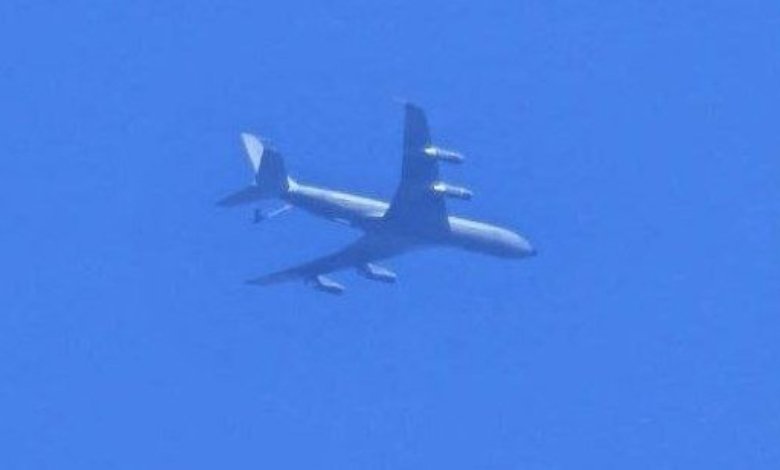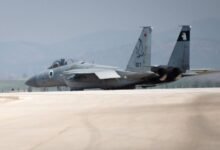Israel’s F-35 Jets Head Towards Red Sea, Raising Concerns of Potential Conflict with Yemen
Movement of Advanced Fighter Jets Sparks Speculation of Possible Israeli Attack on Houthi Rebels in Yemen, Prompting Readiness to Respond

Deployment of Israeli F-35 Fighter Jets Towards Red Sea Raises Alarms Amid Speculations of an Attack on Yemen’s Houthi Rebels; Regional Tensions Escalate as Houthis Vow Retaliation.
On July 20, 2024, a substantial number of F-35 fighter jets were observed taking off from Israel’s Nevatim Airbase, heading towards the Red Sea via Eilat. This significant military movement has ignited a wave of speculation and concern across the region and internationally, with some sources hinting at the possibility of an impending Israeli attack on Yemen. This development comes amidst a backdrop of increasing tensions and complex geopolitical dynamics in the Middle East.
A Display of Military Prowess
The F-35 jets, known for their advanced stealth capabilities and cutting-edge technology, represent the pinnacle of modern military aviation. Their deployment from Nevatim Airbase, a major hub for the Israeli Air Force, underscores the seriousness and potential scale of the operation. As these jets streaked across the skies towards the Red Sea, passing through Eilat, they drew significant attention from military analysts and observers.
The route taken by the jets, towards the Red Sea, is particularly noteworthy. Eilat, located at the southern tip of Israel, serves as a strategic point that opens up various operational possibilities, including access to the Red Sea and beyond. The choice of this route has further fueled speculation about Israel’s strategic intentions and the potential targets within the region.
Speculations of an Israeli Attack on Yemen
The movement of these jets has led to widespread speculation about a potential Israeli military action against Yemen, specifically targeting the Houthi rebels. Yemen has been embroiled in a devastating civil war since 2014, with the Houthi movement, backed by Iran, controlling significant portions of the country, including the capital, Sanaa.
Israel’s concerns about the Houthis stem from their alignment with Iran, a staunch adversary of Israel. The Houthis have been accused of receiving military support from Iran, including advanced weaponry and missile technology. This connection has made the Houthis a significant point of concern for Israel, given the potential threat they pose to regional stability and Israeli interests.
Regional Reactions and Concerns
The potential for an Israeli attack on Yemen has sparked a variety of reactions across the Middle East. Neighboring countries and international actors are closely monitoring the situation, given the potential for a wider conflict that could destabilize the region further.
Saudi Arabia, which leads a coalition fighting the Houthis in Yemen, has historically shared concerns about the Houthi threat and their Iranian backing. However, any direct Israeli involvement in Yemen could complicate the already complex dynamics of the conflict and regional alliances. The potential for civilian casualties and further humanitarian crises in Yemen is a significant concern for international observers.
The Houthis’ Response
In response to the observed movement of Israeli jets, the Houthi rebels have issued statements expressing their readiness to counter any Israeli action. Mohammed Abdul-Salam, a spokesperson for the Houthi movement, declared, “We are fully prepared to defend our territory and sovereignty against any Israeli aggression. Any attack on Yemen will be met with a strong and decisive response.”
The Houthis have previously demonstrated their capability to launch missile and drone attacks against targets in Saudi Arabia and the United Arab Emirates. Their ability to strike back against Israeli interests, either directly or through asymmetric warfare tactics, cannot be underestimated.
International Diplomatic Efforts
The international community is likely to ramp up diplomatic efforts to de-escalate the situation. The United Nations, along with key international players such as the United States, Russia, and the European Union, will be pivotal in mediating between the involved parties to prevent a full-scale conflict.
The United States, a key ally of Israel, has historically played a crucial role in maintaining stability in the Middle East. Washington’s response to the current developments will be critical in shaping the outcome of this unfolding situation. U.S. diplomatic efforts will likely focus on urging restraint on all sides while exploring avenues for dialogue and negotiation.
The Broader Geopolitical Context
This development is occurring against a broader backdrop of shifting alliances and ongoing conflicts in the Middle East. Israel’s concerns about Iran’s influence in the region have been a driving factor in its strategic calculations. The Abraham Accords, which normalized relations between Israel and several Arab nations, including the UAE and Bahrain, have reshaped the geopolitical landscape, but tensions with Iran and its allies remain a constant challenge.
The situation in Yemen is a microcosm of these broader regional dynamics, with multiple actors and interests intersecting. The civil war has caused immense suffering for the Yemeni population, with millions facing food insecurity and lack of access to basic necessities. Any escalation in military activities would further exacerbate the humanitarian crisis.
Conclusion
The sight of F-35 fighter jets taking off from Israel’s Nevatim Airbase and heading towards the Red Sea has set off alarm bells and raised critical questions about the future of regional stability. The possibility of an Israeli attack on Yemen, targeting the Houthi rebels, underscores the volatile and interconnected nature of Middle Eastern geopolitics.
As the world watches closely, the actions of regional and international players will be crucial in determining whether this situation escalates into a broader conflict or is resolved through diplomatic means. The coming days and weeks will likely see intense diplomatic efforts to prevent a new flashpoint in an already troubled region.







